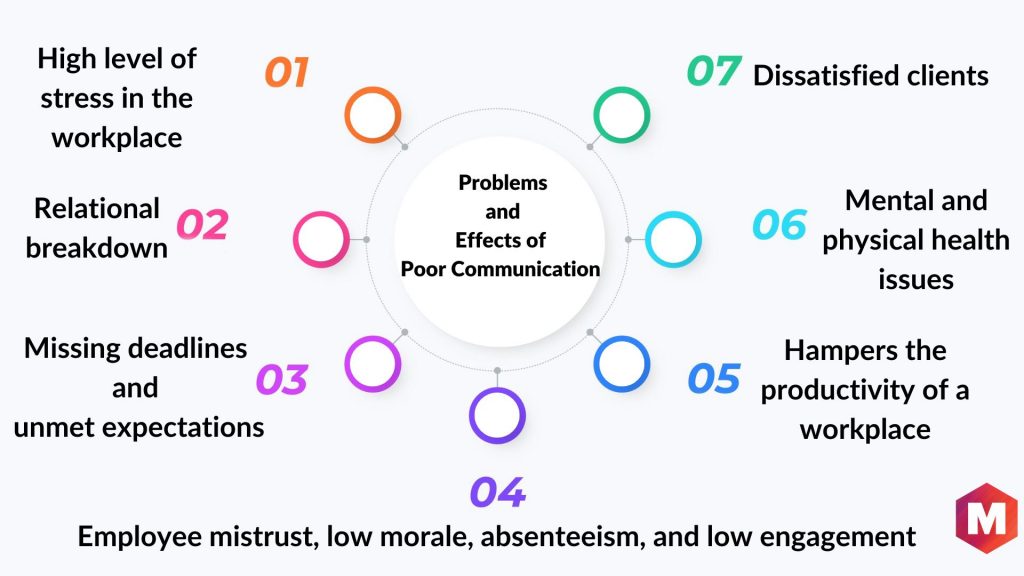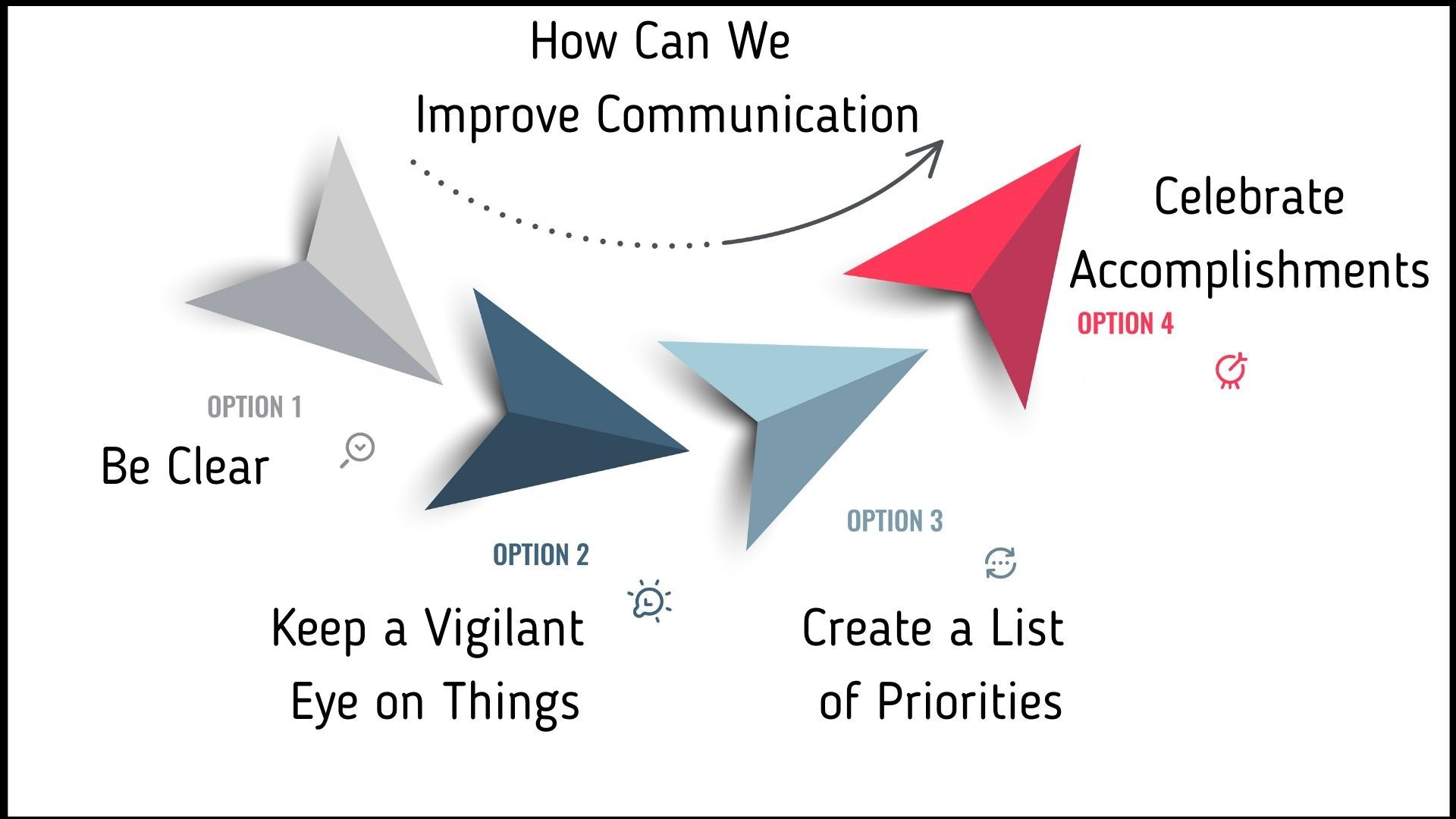Poor communication in the workplace will always lead to innumerable issues. It is important to have solid relationships so that a business entity can grow, thrive, and reach its business goals.
This is possible only when the communication is open and the information can pass smoothly from one end to another. Lack of good communication skills will lead to a dissatisfied and chronic workplace.
Table of Contents
What is Poor Communication in the Workplace?
Poor communication in the workplace can be defined as ineffective team communication between employees, managers and co-workers that results in a breakdown in relationship building and productivity. Poor communication can be caused by many factors such as lack of trust, lack of respect and poor communication skills.
It is often caused by a breakdown in relationship building between employees or co-workers. This can result in workplace concerns such as an employee feeling like they are not being heard or respected by their manager or co-worker which causes them to become defensive when communicating with others.
Poor communication can also be caused by poor listening skills on the part of employees or managers which results in miscommunication between employees and leads to misunderstandings about expectations or projects being worked on.
It can cause negative feelings among coworkers which then leads to lower morale within the office environment which can result in less productivity overall for everyone involved!
Problems and Effects of Poor Communication
The employees may not have their rights reserved in such a place. Some of the problems and effects of poor communication are as follows-
1. High level of stress in the workplace
One of the important effects of poor or ineffective communication in the workplace is high levels of stress. As employees fail to communicate their thoughts and ideas to each other they may feel a sense of urgency. This makes the workplace a tense place where everything is urgent and on the to-do list.
The feeling of panic becomes real and leads to misunderstanding, tension, and stress. The employees feel overworked which can result in lower employee morale and this stress is the onset of several related issues like depression, anxiety, and burn-out. Remember stress will always result in personal and professional issues and this might prove harmful for both the employee and his workplace.
2. Relational breakdown
Poor workplace communication will lead to relational breakdowns. When there are stress, anger, and miscommunication in a workplace then it is obvious that it will also lead to frustration and helplessness.
Accusatory tone, sense of uncertainty, the high pitch of voice, and arguments will rule the day and there will be a fear of not working to the best of ability. Employees will lose confidence and the emotional upheaval will lead to a breakdown in staff relations which will be at an all-time down in the workplace.
3. Missing deadlines and unmet expectations
When employees are unable to get a fair idea about their roles and responsibility and figure out their priorities in the scheme of things then it may often prove a disaster.
The inability to pass important information is because of poor understanding and communication in the workplace. It will have a direct impact on the projects and result in missing deadlines and unmet expectations.
4. Employee mistrust, low morale, absenteeism, and low engagement
A major effect of poor communication in the workplace is that employees start losing confidence in their abilities and also in the capabilities of their organization. Intense emotions will lead to low morale and mistrust.
There will no longer be any joy in starting the day instead the end of the shift will look like a relief. Despair and unhealthy communication are major reasons why employee engagement is low and absenteeism is high in some places.
5. Hampers the productivity of a workplace
A person often has to work a good chunk of his waking hours in the organization. Sometimes he works alone and at other times he is an integral part of a good team. What will happen if he is unable to work and communicate his thoughts and ideas with his team members or clients because of poor communication in the workplace?
An important impact of poor workplace communication skills is that it becomes impossible to pass useful information from one end to another and this hampers the productivity of a workplace. When people are unable to keep each other in the loop because of a lack of effective communication skills then the employees may find it difficult to complete projects. This will have a direct impact on the productivity of a business organization
6. Mental and physical health issues
When employees are unable to reach their full potential they may start having doubts. The bottom line is that the thoughts about job security and survival in the company will take prominence over efficiency and productivity.
If things are not going the way of people then it results in fear, helplessness and concern. It is a proven fact that the first casualty of unhealthy workplace communication issues is the health of a person and the lack of effective emotional support and self-care will create mental problems and health issues.
7. Dissatisfied clients
Poor communication leads to unfinished projects, missed deadlines, angry leadership and dissatisfied clients. The clients will no longer have faith and they might take their business away from the company.
If the employees are at fault how can the companies blame their clients? This reality will make the leadership unhappy and frustrated and they will be unable to deal with clients authoritatively.
The Importance of Effective Workplace Communication
Effective workplace communication is a key component of any productive and effective business. Communication is the foundation for all other aspects of the business, including customer service, employee satisfaction, and overall success.
If you have employees who are not communicating effectively with one another or with customers, then your company could be missing out on important information. In turn, this could lead to inefficient processes or even worse—a loss of revenue or a drop in customer satisfaction levels.
In order to ensure that there are no further communication problems or issues within your organization, it is important to understand what factors can contribute to poor communication in the workplace.
Examples of Poor Communication in the Workplace
There are many examples of poor communication in the workplace.
1. Project Assignment
An employee is given an assignment and has to complete it on their own, but they don’t know how to do it. They do not make an effort to ask for help or clarification, and they leave the task incomplete.
2. Manager
A manager is expected to communicate with one of their employees about a project that needs to be done, but they don’t give any instructions or deadlines for when it should be completed.
3. Between Employees
Two employees are working on a project together but do not communicate with each other about what they need from each other in order for the project to be finished successfully (e.g., one employee may need some data from another’s department).
4. Between Manager and Employee
A manager is supposed to discuss an employee’s performance with them, but they don’t explain what the employee should be doing differently or better.
5. Communication within the Team
The entire team doesn’t communicate objectives with each other about their projects and tasks; instead, each person works on their own assignments without discussing them with others first.
Causes of Poor Communication in the Workplace
Poor communication can be caused by a number of factors in the workplace to avoid workplace conflict. Here are some of the most common causes of internal communications:
Lack of Training or Education
If employees don’t know how to communicate, or if they haven’t been taught how to communicate effectively, then they may not be able to express themselves in ways that make sense for their coworkers. This can lead to misunderstandings, which can affect the way people feel about one another at work.
Lack of Emotional Intelligence
If employees aren’t comfortable with their own emotions and struggles, then they may not know how to handle others’ emotions either.
In these cases, it’s important for managers and coworkers alike to give each other space when emotions are running high so that everyone feels safe expressing themselves without fear of judgment or retaliation from management for doing so.
How Can We Improve Communication?
Workplace poor communication is a truth that business organizations cannot hide any longer. More and more companies are working diligently to first understand the communication issues and then take steps that will improve the overall communication and employee engagement in their workplace. Some of the steps that can improve communication are
1. Be clear
Be clear in your expectations in business meetings if you want to improve communication. Define the job descriptions as well as the role and responsibility of the employees. Send a proper email about projects describing the requirements in detail.
2. Keep a vigilant eye on things
Sending out proper instructions is only the first step because the superiors need to keep a vigilant eye on its employees and their workings for good workplace communication. Keep a check on how things are progressing, ask questions, listen and understand the problems of the different employees, encourage open communication and lend out a helping hand if the staff is unable to keep with the current organizational demands.
3. Create a list of priorities
Make a list and prioritize the things as per the need of the hour for good and strong communication skills in the workplace. Keep employees in the loop and make sure that information may pass and every person is working accordingly to fulfill organization obligations.
4. Celebrate accomplishments
When a company celebrates the accomplishments and progress of its employees it creates a healthy company culture. The bottom line is that effective communication skills will lead to a growth mindset and positive direction in a business organization and this is all because of improved and good communication.
Final Words!
Poor communication really can hurt a company, and it’s a problem that many business leaders take seriously. Unfortunately, ‘poor communication’ is a pretty broad issue, so it’s difficult to figure out exactly how to handle the issue.
That said, there are steps that business owners can take to ensure that their message is heard by their employees – and get the job done right in the process.
Liked this post? Check out the complete series on Communication



